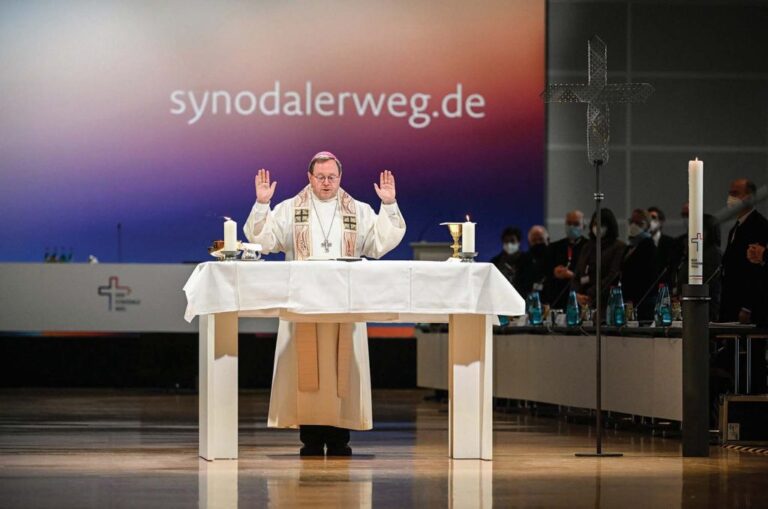The fourth synodal assembly of the Church in Germany’s widely-publicised Synodal Way is taking place across the weekend and is once more attracting attention for all the wrong reasons as dissension between bishops marred the opening days’ proceedings, leading to Cardinal Reinhard Marx requesting that certain bishops publicly justify their votes, votes that aligned with current Church teaching.
The Synodal Way members are currently meeting between September 8–10 in Frankfurt, with 14 texts, mostly challenging core ideals, being considered for first or second reading and falling into two categories: those that can be adopted without consent from Rome and lead to substantive changes in Germany, and those where the decision-making power lies solely with the Vatican.
Thursdays’ developments saw participants embroiled in frosty exchanges as the assembly failed to pass a resolution calling for a change in the Church’s approach to sexual ethics. The resolution failed to gain enough support from bishops at the synodal meeting, The Pillar reported.
Majority
The majority of participants in the Synodal Way process voted to adopt a 30-page document entitled “Life in succeeding relationships – The principles of renewed sexual ethics” – but the resolution did not gain a two-thirds majority among the Synodal Way’s bishop participants, a necessity for the unanimous approval of any resolution. Sixty-one percent of German bishops voted in favour of the resolution, according to initial German media reports.
The text contended that “it will not be possible to reorient pastoral care without re-defining the emphasis of the Church’s sexual teaching to a significant degree”. It said that it is “urgently necessary to overcome some of the restrictions in questions of sexuality, for reasons of sexual science as well as theology”, while maintaining that “same-sex sexuality – also expressed in sexual acts – is … not a sin that causes separation from God, and it is not to be judged as intrinsically bad”.
After the vote, delegates spoke for more than an hour about the vote, with many participants articulating their disappointment with the bishops’ stances. Most participants said bishops had not listened to their people, and that their decision would both harm German Catholics and lead to even greater disharmony in the Church.
According to the Synodal Way’s official social media accounts, Bishop Georg Bätzing, president of the German bishops’ conference, said he was “personally disappointed with this vote”.
“I couldn’t see in the debate what the majorities would be like. That means for me: the practice of synodality has not yet gone far enough,” Bätzing said Thursday.
This morning
This morning, September 9, Bishop Bätzing declared that he would bring the vetoed text to the German bishops’ ad limina meeting in Rome in November, as well the synod on synodality in Rome next year. He added that he would also seek to implement the text in his own Diocese of Limburg, saying: “I know several bishops will do similarly”.
Cardinal Marx, former president of the bishops’ conference, also said that he is: “very disappointed. The bishops must also publicly stand by their positions and should justify them”.
Irme Stetter-Karp, president of the foremost lay Central Committee of German Catholics (Zdk), said that bishops who rejected the text should have intimated their opposition more coherently during earlier debates. But supporters of the minority have subsequently alleged that there was an intimidating atmosphere at the assembly.
Participants were also scheduled to discuss a 31-page document entitled “Women in ministries and offices in the Church” – but this debate was later postponed. The document says that “for generations, many women have known that they were called by God to be deaconesses or priestesses” and “in future, it should no longer be gender that decides on the allocation of ministries, but the vocation, abilities, and skills that serve the proclamation of the Gospel in our time”.
Synodal Way members turned to the text late on Friday morning after the presentation of a report on combatting sexual abuse. Advocates of the document on women in ministries continuously dialogued with the synodal way’s minority, urging them to voice their objections, as well trying to remedy and dispel their concerns.
Following a vote, the assembly is due to consider a 20-page document entitled “Priestly existence today”. The text calls for “priestly ministry to be truly inculturated into contemporary society” in light of the clerical abuse crisis, which has had a disastrous impact on the German Church.
Vote
Participants are also scheduled vote on a document called “A re-evaluation of homosexuality in the Magisterium” that proposes alterations to the Catechism of the Catholic Church, as well as a proposal to create a powerful permanent Synodal Council, composed of bishops and lay people, to oversee the Church in Germany.
Out of the fourteen papers set to be discussed, five face their first vote and nine have their second reading, though it is unknown whether this is possible before the meeting ends on Saturday. After documents pass their second reading, they are officially implemented as resolutions of the Synodal Way.
All participants are scheduled to convene again in Frankfurt on March 9-11, 2023, for final votes on the synodal way’s final documents.



